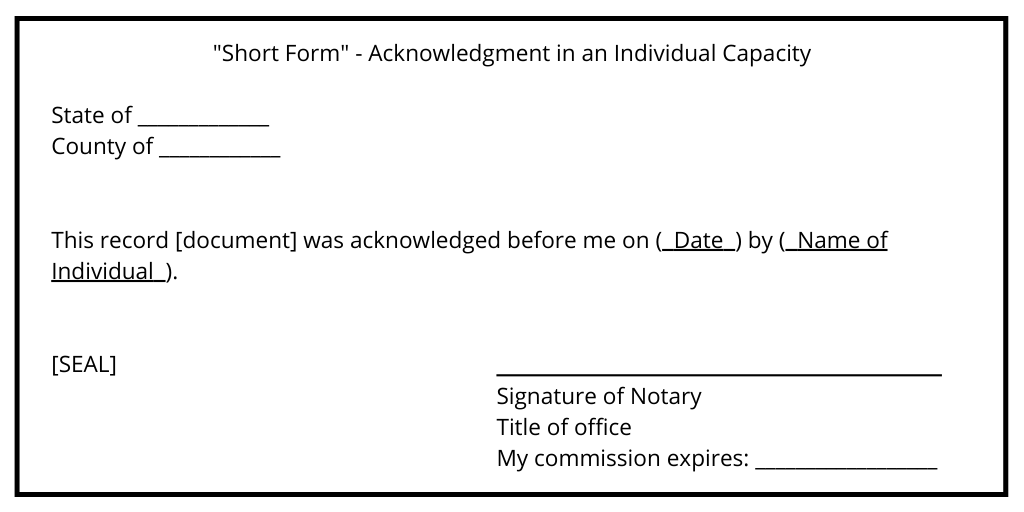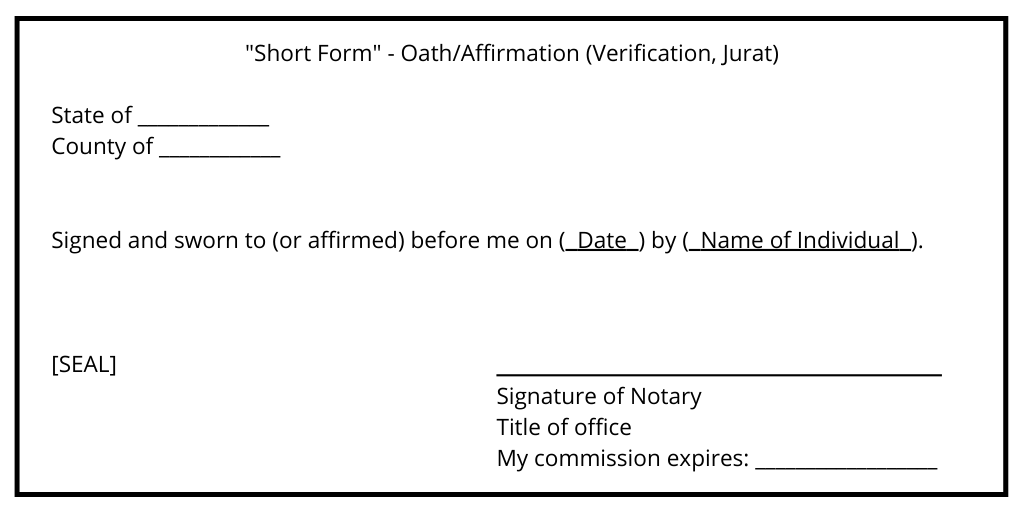Notary Public Underwriters Blog
Notarial Certificates - More Details, More Responsibility
- Details
- Published: April 15, 2021

A completed notarial certificate, when an authorized act requires one, is a notary’s enduring evidence of the facts of the notarization performed. The certificate provides assurance that the named individual appeared in your presence, was identified, demonstrated comprehension and voluntary intent, and signed the document. By signing and sealing a notarial certificate, a notary certifies the accuracy of the information in it.
The straightforward “short form” certificate language for the most common signature notarial acts—acknowledgments and oaths/affirmations (jurats, verifications)—is uncomplicated and direct, as seen in these examples from the Uniform Law Commission’s Revised Uniform Law on Notarial Acts.


This classic short form wording works because it meets the “substantially similar” standard of so many states’ statutory certificate forms. Short form certificates have been used throughout the United States for many years, and remain in use today. The classic short form certificate language isn’t concerned with how the formalities of notarization were performed. What matters is simply whether they were performed, which the notary certifies by completing, signing and sealing the notarial certificate.
It has been ever thus but, if recent state notary law revisions are any indication, states might trend toward requiring additional certificate language describing how certain notarization formalities were performed.
Two excellent examples are found in recent updates to Florida’s and Missouri’s notary public laws.
- Florida is one of the 31 states that have (at this exact time) authorized performance of notarial acts for remotely located individuals. The core difference between traditional notarization and a “remote online notarization” is how the principal personally appears before the notary. For a traditional notarization, the principal must appear in the notary’s physical presence. But for remote online notarization, the remotely located principal personally appears by use of audio-visual communication technology.
As such, Florida’s notary law now requires every completed notarial certificate for an acknowledgment or oath/affirmation (jurat, verification)—regardless of whether the notarization was performed by a traditional or Remote Online Notary, and regardless how the individual signed the document*—to contain a statement indicating how the individual personally appeared. For example, “Sworn to (or affirmed) and subscribed before me by means of ▢ physical presence or ▢ online notarization, this ___ day of ____(year)….”
_______________
*Florida’s notary law specifies that an acknowledgment may be signed in an individual or representative capacity; and that an individual who is physically unable to sign a document requiring an acknowledgment or oath/affirmation may personally direct the notary to sign on the physically unable individual’s behalf.
- Missouri (which by the way also authorizes remote online notarization) updated its notary law in the latter part of 2020. Notaries’ certificates now indicate not only whether an individual “personally appeared” for a notarial act or “personally appeared by remote online means,” but also exactly how the notary identified the individual. For example, immediately after the document signer’s name, the notary indicates “personally known to me,” or “proved to me through identification documents, which were ____,” or “proved to me on the oath or affirmation of ______, [this refers to a single credible witness] who is personally known to me and stated to me that (he)(she) personally knows the document signer and is unaffected by the document,” or “proved to me on the oath or affirmation of ___ and ___, [this refers to two credible witnesses] whose identities have been proven to me through identification documents and who have stated to me that they personally know the document signer and are unaffected by the document….”
If you’re thinking, “Well, I’m not commissioned in Florida or Missouri so this information doesn’t affect me,” then please reconsider. The point is, you cannot assume year-in and year-out that your state laws, administrative rules and recommended practices remain static. They can change, subtly or dramatically, but always with the potential to affect something in the way that you perform a notarial act or provide evidence of your act in your notarial certificate.
Keep in mind that you are solely responsible for ensuring that every notarial certificate you complete complies fully with your state’s law and administrative rules. States could be trending toward requiring more notarial certificate details about how certain formalities of notarization were performed, which places greater responsibility on the officiating notary.
So, notaries… stay vigilant, soak in every detail of every change to your state notary laws and administrative rules, and be ready when necessary to shoulder more responsibility for the completeness and accuracy of your notarial certificates. You can do this!
Information is valid as of April 15, 2021. We do our best to provide accurate, up-to-date information, but please keep in mind it is the reader’s responsibility to know the notary law in their state.
